Strictly Personal
Russia, Ukraine will one day regret shaming African chiefs on peace mission, By Charles Onyango-Obbo
Published
10 months agoon
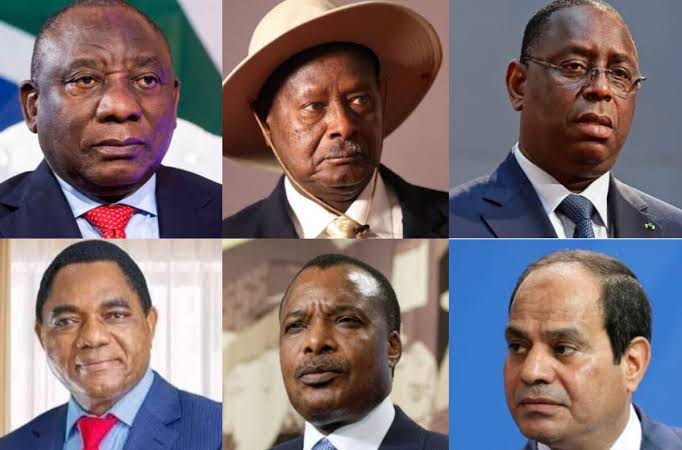
As Uganda President Yoweri Museveni battled Covid-19 last week and stayed in confinement, social media did what it does best; spew wild tales about his illness.
One version went that the son of Kaguta was in good health but came up with the Covid-19 story to avoid travelling with other African leaders on a mission to sell Ukrainian President Volodymyr Zelenskyy and Russian President Vladimir Putin a 10-point plan aimed at brokering peace in their war.
South African President Cyril Ramaphosa led an olive-branch-bearing group, including the presidents of Comoros, Senegal, and Zambia, as well as Egypt’s prime minister and envoys from the Republic of Congo and Uganda to Kyiv and Moscow. Some say that, predictably, they came back empty-handed.
Of course, only people who don’t know Museveni well would spin such a conspiracy. He’s a man who doesn’t like to look weak or vulnerable, so, any day he would have taken being rebuffed by Zelenskyy and Putin over being floored by a virus.
The African mission has been rebuked at home, laughed at for flying thousands of kilometres away to the eastern corner of Europe to try and stop a “mzungu war” when they would have walked and put that effort into ending several deadly conflicts closer to them at home.
They were also accused of being “un-African.”
The African group only did a little prior diplomatic work to prepare for the mission.
The people making that charge said African diplomacy is like marriage. The young man looking to ask someone’s daughter to marry him only shows up at his prospective in-law’s home to ask for her hand with prior groundwork.
Usually, by the time he and his entourage arrive, wiser heads from both sides will have held several meetings and agreed on all details, including bride price, where it is demanded.
They will have been assured that the family will green-light the marriage and ask for 20 long-horned Ankole cattle, not 50.
You might be fined if you have been living with someone’s daughter in sin without first getting a permit from the church, Registry, or the elders. However, you will know the fine is $1,000, not $5,000.
The elders think it isn’t a good look to surprise a future son-in-law, changing the penalty and forcing him into the unseemly position of passing the hat around, asking for more money than he carried because, suddenly, the fine went up.
Of course, nothing in all this finely laid-out plan will stop a drunk uncle or cantankerous aunt from disrupting things.
Anyway, the result of all this background work is that the day of “introduction” (betrothal ceremony) is mostly a performative function. Ramaphosa and Company didn’t do the diplomatic equivalent.
But there is something else. For a man who views himself as a pan-African patriarch and Bismarck, Museveni has, surprisingly, been part of relatively few peace mediations in Africa. Apart from the Democratic Republic of Congo, Somalia, and South Sudan, he has dabbled in little else, and even in these, he did not put his neck out as the lead like Ramaphosa did on Ukraine-Russia.
He knows a few things about what it takes to succeed in mediation. For starters, the obvious case for peace — and what the United Nations charters say — don’t cut it with warriors. The leaders and rebels who go to war and butcher people, know that international laws and the Bible and Quran condemn such atrocities. It doesn’t help to throw these books at them.
The men of war understand three things. First, leaders who have been successful in these peace missions are those who have something concrete and juicy to offer: End the war, and get $500 million (part of which they steal) for reconstruction. Or sanctions will be lifted, and the $50 billion frozen in Western banks will be released.
Or surrender, allow new leaders to come in and rebuild, and you will be given a lovely home on the French Riviera and a $1.5 million monthly stipend to spend as you wish, including gambling in the casino.
The second one is a credible threat. Nigeria did it with Liberia’s corrupt president Charles Taylor in 2006. They pressured him to resign, arrested him, and handed him over to the Special Court for Sierra Leone, which eventually found him guilty of aiding and abetting war crimes there. Nigeria had the ability to bring Taylor to heel.
The other is an overwhelming moral force. South African statesman Nelson Mandela and the influential human rights activist, Anglican bishop Desmond Tutu were the last two people in Africa who had it in recent times. Globally, a few people like Albanian-Indian Catholic nun Mother Teresa, the Pope, and a handful of fabulously wealthy philanthropists also had/have it.
Ramaphosa’s delegation had none of the three assets above. And as influential African leaders go — except for one or two — his group didn’t comprise the First Seven figures with political clout on the continent. Small wonder, then, that Putin reportedly cut them off halfway as they were making their pitch to tell them why their suggestions didn’t fly.
Still, it was not all in vain. The powerlessness of the delegation was also its asset. They were not menacing or arrogant and giving them a small bone to take him as a victory trophy would have helped Putin and Zelenskyy look like sensible, practical men.
Putin, especially, is likely to send his foot soldiers to Africa one of these days looking for a mine. Closing a deal could be harder, having sent our chiefs away shamefaced.
Charles Onyango-Obbo is a journalist, writer, and curator of the Wall of Great Africans. Twitter@cobbo3
You may like
-


Intel Liftoff Hackathon 2024 calls for applications from African AI startups
-
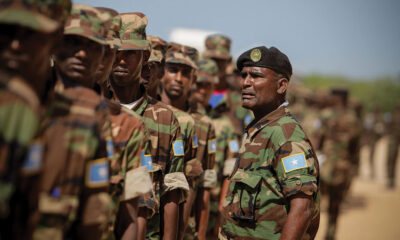

African leaders seek change in fight against terrorism at Nigerian summit
-


Africa’s largest tech hub AfriLabs welcomes 16 new additions
-
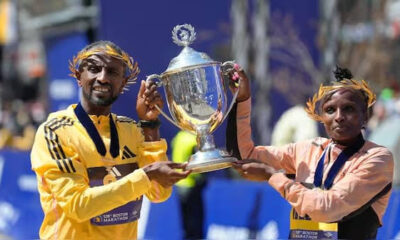

Ethiopia’s Lemma, Kenya’s Obiri give Africa double podium finish at Boston Marathon
-


Russia begins diesel exports to Sudan as EU boycott bites
-


Briton Russell Cook makes history as first man to run the length of Africa
Strictly Personal
This Sudan war is too senseless; time we ended it, By Tee Ngugi
Published
11 hours agoon
April 28, 2024
Why are the Sudanese Armed Forces (SAF) and the paramilitary Rapid Support Forces (RPF) engaged in a vicious struggle? It is not that they have ideological, religious or cultural differences.
Not that people should fight because of these kinds of differences, but we live in a world where social constructions often lead to war and genocide. It is not that either side is fighting to protect democracy. Both sides were instruments of the rapacious dictatorship of Omar el-Bashir, who was overthrown in 2019.
Both are linked to the massacres in Darfur during Bashir’s rule that led to his indictment by the International Criminal Court for crimes against humanity. They both stood by as ordinary, unarmed people took to the streets and forced the removal of the Bashir regime.
None of these entities now fighting to the last Sudanese citizen has any moral authority or constitutional legitimacy to claim power. They both should have been disbanded or fundamentally reformed after the ouster of Bashir.
The SAF and the RSF are fighting to take over power and resources and continue the repression and plunder of the regime they had supported for so long. And, as you can see from news broadcasts, they are both well-versed in violence and plunder.
Since the fighting began in 2023, both sides have been accused of massacres that have left more than 30,000 people dead. Their fighting has displaced close to 10 million people. Their scramble for power has created Sudan’s worst hunger crisis in decades. Millions of refugees have fled into Chad, Ethiopia and South Sudan.
The three countries are dubious places of refuge. Chad is a poor country because of misrule. It also experiences jihadist violence. Ethiopia is still simmering with tensions after a deadly inter-ethnic war.
And South Sudan has never recovered from a deadly ethnic competition for power and resources. African refugees fleeing to countries from which refugees recently fled or continue to flee sums up Africa’s unending crisis of governance.
Africa will continue to suffer these kinds of power struggles, state failure and breakdown of constitutional order until we take strengthening and depersonalising our institutions as a life and death issue. These institutions anchor constitutional order and democratic process.
Strong independent institutions would ensure the continuity of the constitutional order after the president leaves office. As it is, presidents systematically weaken institutions by putting sycophants and incompetent morons in charge. Thus when he leaves office by way of death, ouster or retirement, there is institutional collapse leading to chaos, power struggles and violence. The African Union pretends crises such as the one in Sudan are unfortunate abnormally. However, they are systemic and predictable. Corrupt dictatorships end in chaos and violence.
Tee Ngugi is a Nairobi-based political commentator.
Strictly Personal
Air Peace, capitalism and national interest, By Dakuku Peterside
Published
2 weeks agoon
April 16, 2024
Nigerian corporate influence and that of the West continue to collide. The rationale is straightforward: whereas corporate activity in Europe and America is part of their larger local and foreign policy engagement, privately owned enterprises in Nigeria or commercial interests are not part of Nigeria’s foreign policy ecosystem, neither is there a strong culture of government support for privately owned enterprises’ expansion locally and internationally.
The relationship between Nigerian businesses and foreign policy is important to the national interest. When backing domestic Nigerian companies to compete on a worldwide scale, the government should see it as a lever to drive foreign policy, and national strategic interest, promote trade, enhance national security considerations, and minimize distortion in the domestic market as the foreign airlines were doing, boost GDP, create employment opportunities, and optimize corporate returns for the firms.
Admitted nations do not always interfere directly in their companies’ business and commercial dealings, and there are always exceptions. I can cite two areas of exception: military sales by companies because of their strategic implications and are, therefore, part of foreign and diplomatic policy and processes. The second is where the products or routes of a company have implications for foreign policy. Air Peace falls into the second category in the Lagos – London route.
Two events demonstrate an emerging trend that, if not checked, will disincentivize Nigerian firms from competing in the global marketplace. There are other notable examples, but I am using these two examples because they are very recent and ongoing, and they are typological representations of the need for Nigerian government backing and support for local companies that are playing in a very competitive international market dominated by big foreign companies whose governments are using all forms of foreign policies and diplomacy to support and sustain.
The first is Air Peace. It is the only Nigerian-owned aviation company playing globally and checkmating the dominance of foreign airlines. The most recent advance is the commencement of flights on the Lagos – London route. In Nigeria, foreign airlines are well-established and accustomed to a lack of rivalry, yet a free-market economy depends on the existence of competition. Nigeria has significantly larger airline profits per passenger than other comparable African nations. Insufficient competition has resulted in high ticket costs and poor service quality. It is precisely this jinx that Air Peace is attempting to break.
On March 30, 2024, Air Peace reciprocated the lopsided Bilateral Air Service Agreement, BASA, between Nigeria and the United Kingdom when the local airline began direct flight operations from Lagos to Gatwick Airport in London. This elicited several reactions from foreign airlines backed by their various sovereigns because of their strategic interest. A critical response is the commencement of a price war. Before the Air Peace entry, the price of international flight tickets on the Lagos-London route had soared to as much as N3.5 million for the economy ticket. However, after Air Peace introduced a return economy class ticket priced at N1.2 million, foreign carriers like British Airways, Virgin Atlantic, and Qatar Airways reduced their fares significantly to remain competitive.
In a price war, there is little the government can do. In an open-market competitive situation such as this, our government must not act in a manner that suggests it is antagonistic to foreign players and competitors. There must be an appearance of a level playing field. However, government owes Air Peace protection against foreign competitors backed by their home governments. This is in the overall interest of the Nigerian consumer of goods and services. Competition history in the airspace works where the Consumer Protection Authority in the host country is active. This is almost absent in Nigeria and it is a reason why foreign airlines have been arbitrary in pricing their tickets. Nigerian consumers are often at the mercy of these foreign firms who lack any vista of patriotism and are more inclined to protect the national interest of their governments and countries.
It would not be too much to expect Nigerian companies playing globally to benefit from the protection of the Nigerian government to limit influence peddling by foreign-owned companies. The success of Air Peace should enable a more competitive and sustainable market, allowing domestic players to grow their network and propel Nigeria to the forefront of international aviation.
The second is Proforce, a Nigerian-owned military hardware manufacturing firm active in Rwanda, Chad, Mali, Ghana, Niger, Burkina Faso, and South Sudan. Despite the growing capacity of Proforce in military hardware manufacturing, Nigeria entered two lopsided arrangements with two UAE firms to supply military equipment worth billions of dollars , respectively. Both deals are backed by the UAE government but executed by UAE firms.
These deals on a more extensive web are not unconnected with UAE’s national strategic interest. In pursuit of its strategic national interest, India is pushing Indian firms to supply military equipment to Nigeria. The Nigerian defence equipment market has seen weaker indigenous competitors driven out due to the combination of local manufacturers’ lack of competitive capacity and government patronage of Asian, European, and US firms in the defence equipment manufacturing sector. This is a misnomer and needs to be corrected.
Not only should our government be the primary customer of this firm if its products meet international standards, but it should also support and protect it from the harsh competitive realities of a challenging but strategic market directly linked to our national military procurement ecosystem. The ability to produce military hardware locally is significant to our defence strategy.
This firm and similar companies playing in this strategic defence area must be considered strategic and have a considerable place in Nigeria’s foreign policy calculations. Protecting Nigeria’s interests is the primary reason for our engagement in global diplomacy. The government must deliberately balance national interest with capacity and competence in military hardware purchases. It will not be too much to ask these foreign firms to partner with local companies so we can embed the technology transfer advantages.
Our government must create an environment that enables our local companies to compete globally and ply their trades in various countries. It should be part of the government’s overall economic, strategic growth agenda to identify areas or sectors in which Nigerian companies have a competitive advantage, especially in the sub-region and across Africa and support the companies in these sectors to advance and grow to dominate in the African region with a view to competing globally. Government support in the form of incentives such as competitive grants ,tax credit for consumers ,low-interest capital, patronage, G2G business, operational support, and diplomatic lobbying, amongst others, will alter the competitive landscape. Governments and key government agencies in the west retain the services of lobbying firms in pursuit of its strategic interest.
Nigerian firms’ competitiveness on a global scale can only be enhanced by the support of the Nigerian government. Foreign policy interests should be a key driver of Nigerian trade agreements. How does the Nigerian government support private companies to grow and compete globally? Is it intentionally mapping out growth areas and creating opportunities for Nigerian firms to maximize their potential? Is the government at the domestic level removing bottlenecks and impediments to private company growth, allowing a level playing field for these companies to compete with international companies?
Why is the government patronising foreign firms against local firms if their products are of similar value? Why are Nigerian consumers left to the hands of international companies in some sectors without the government actively supporting the growth of local firms to compete in those sectors? These questions merit honest answers. Nigerian national interest must be the driving factor for our foreign policies, which must cover the private sector, just as is the case with most developed countries. The new global capitalism is not a product of accident or chance; the government has choreographed and shaped it by using foreign policies to support and protect local firms competing globally. Nigeria must learn to do the same to build a strong economy with more jobs.
EDITOR’S PICK


Behind the News: All the backstories to our major news this week
Over the past week, there were lots of important stories from around the African continent, and we served you some...
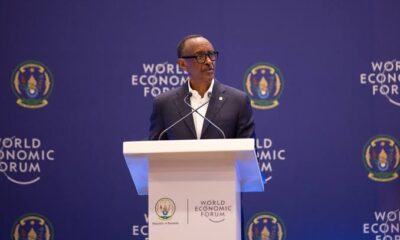

Video: How Rwanda is driving Ai revolution in Africa
In this video, the Managing Director of Rwanda’s Centre for the Fourth Industrial Revolution, Crystal Rugege, speaks on the country’s...


This Sudan war is too senseless; time we ended it, By Tee Ngugi
Why are the Sudanese Armed Forces (SAF) and the paramilitary Rapid Support Forces (RPF) engaged in a vicious struggle? It...
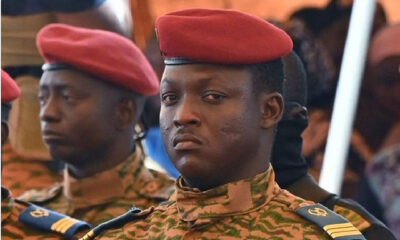

Burkina Faso investigating reports of northern killings
A government spokesman has revealed that Burkina Faso is looking into reports that 223 people were killed by the Burkinabe...


Nigeria: Bureaux De Change operators to harmonise retail FX market
Amidst the volatility around the Nigerian currency and its foreign exchange market, the Association of Bureaux De Change Operators in...


France willing to pay for Morocco’s 3GW power line to Western Sahara
Bruno Le Maire, the French finance minister, said on Friday that France was ready to help pay for a 3...
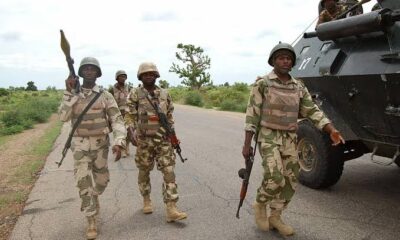

Nigerian troops neutralise 216 terrorists, arrest 332 in one week— Official
The Nigerian Army Defence Headquarters (DHQ) says troops from different operation theaters across the country neutralised 216 terrorists and arrested...
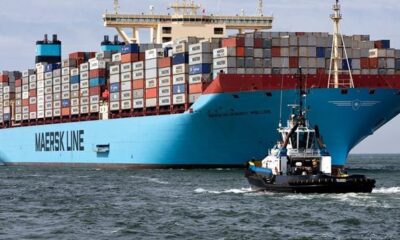

Nigeria loses $9.2 billion to foreign shipowners
A group of maritime experts has revealed that Nigeria loses $9.2bn a year to foreign shipping lines that carry goods...


Nigeria wants managers for proposed $10 billion diaspora fund
A tender paper shows that Nigeria is looking for fund managers for a $10 billion diaspora fund to bring in...


Al Ahly, Esperance to clash in CAF Champions League final
Two of Africa’s club giants, Egypt’s Al Ahly and Esperance of Tunisia, will do battle next month over two legs...
Trending
-

 Culture1 day ago
Culture1 day agoCollabo with Burna Boy enabled me buy house for my mum— Mozambican DJ Tarico
-

 Tech1 day ago
Tech1 day agoRepAir, Cella partner to launch carbon capture in Kenya
-

 Sports1 day ago
Sports1 day agoAl Ahly, Esperance to clash in CAF Champions League final
-
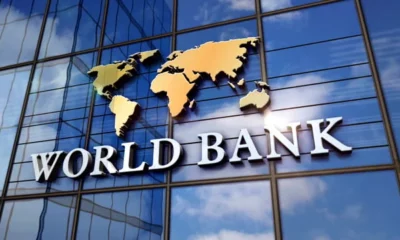
 VenturesNow2 days ago
VenturesNow2 days agoWorld Bank grants Malawi $57.6 million for food crisis


